Imants Barušs' Books
Death as an Altered State of
Consciousness: A Scientific Approach
American Psychological Association, 2023

 What
happens when we die? Death is clearly an altered state of consciousness. But is
it merely oblivion, as materialists believe, or does consciousness continue in
some form? And, if so, what are its properties? In this book, the author
investigates the scientific data for answering these questions in chapters about
after-death communication, mediumship, instrumental transcommunication,
near-death experiences, past-life experiences, and other anomalous phenomena
associated with death. This discussion will broaden the reader’s perspective and
fill an educational need for researchers, teachers, and practitioners of this
understudied subject matter.
What
happens when we die? Death is clearly an altered state of consciousness. But is
it merely oblivion, as materialists believe, or does consciousness continue in
some form? And, if so, what are its properties? In this book, the author
investigates the scientific data for answering these questions in chapters about
after-death communication, mediumship, instrumental transcommunication,
near-death experiences, past-life experiences, and other anomalous phenomena
associated with death. This discussion will broaden the reader’s perspective and
fill an educational need for researchers, teachers, and practitioners of this
understudied subject matter.
Finally, a book written by a skilled researcher, teacher, and communicator that
presents the diverse areas of evidence that collectively all point in one
direction—toward the survival of consciousness after physical death. Dr. Barušs
is deeply thoughtful about alternative interpretations of the different areas of
evidence. Although he is balanced and fair, he allows the best evidence to rise
to the surface and helps the reader appreciate its importance. Since all living
systems face the fact of physical death, having the opportunity to learn the
evidence for survival of consciousness in a reader-friendly yet scholarly manner
is refreshing and essential. This book is destined to become a classic. It
deserves to be read and pondered by psychologists, scientists more broadly, and
the science-minded public in general.
—Gary E. Schwartz, PhD, Professor of
Psychology, Medicine, Neurology, Psychiatry and Surgery, University of Arizona,
Tucson, AZ, United States; Director, Laboratory for Advances in Consciousness
and Health
If you are interested in knowing what the afterlife looks like to a serious
academic studying the available literature from both a scientific and spiritual
perspective, there is no better book that I could recommend. Dr. Barušs’s
approach is thoughtful and well-informed. He is able to integrate masses of data
to carefully delineate possibilities in an area that most people find confusing
at best.
—Jeffrey Mishlove, PhD, Host and Producer, New Thinking Allowed
YouTube channel
Death as an Altered State of Consciousness: A Scientific Approach is
a key contribution to the scientific literature exploring the nature of
consciousness. You will be delighted with the way the narrative captures your
interest, as well as the clear organization of Barušs’s arguments. He builds
compelling evidence from a variety of research areas, including near-death
experiences. This book will be of special interest to caregivers in end-of-life
care, offering a new understanding of this highly debated and often
misunderstood topic.
—Marjorie Woollacott, PhD, Professor, Institute of
Neuroscience, University of Oregon, Eugene, OR, United States
Barušs is just one of the few real authorities on altered states. I can’t wait
to order a copy!
—Charles T. Tart, PhD, Professor Emeritus, University of
California Davis, Davis, CA, United States; Editor, Altered States of
Consciousness
Even the most skeptical readers will see Death
as an Altered State of Consciousness’s relevance to ongoing developments in
dissociative identity disorder, fantasy proneness, grief counseling, and
psychedelic-assisted psychotherapy and other means of personality
transformation. Barušs’s lively writing style and his judicious use of
intriguing examples make it difficult to put this book down.
—Stanley
Krippner, PhD, Affiliated Distinguished Professor, California Institute of
Integral Studies, San Francisco, CA, United States; Coeditor, Varieties of
Anomalous Experience: Examining the Scientific Evidence
Perhaps the most important book of our age, and certainly among the most
fascinating. Not since Rudolf Steiner, Emanuel Swedenborg, and The
Tibetan Book of the Dead (Bardo Thodol) have we been treated
to such a rich tour of conscious experience during dying and death. And this
time with scientific rigor.
—Allan Leslie Combs, PhD, Author, The Radiance of
Being: Understanding the Grand Integral Vision; Living the Integral Life and
Consciousness Explained Better: Towards an Integral Understanding of the
Multifaceted Nature of Consciousness
This book can be obtained from the publisher
American Psychological Association Books or your favourite
bookseller.
Radical Transformation: The Unexpected Interplay
of Consciousness and Reality
Imprint Academic, 2021
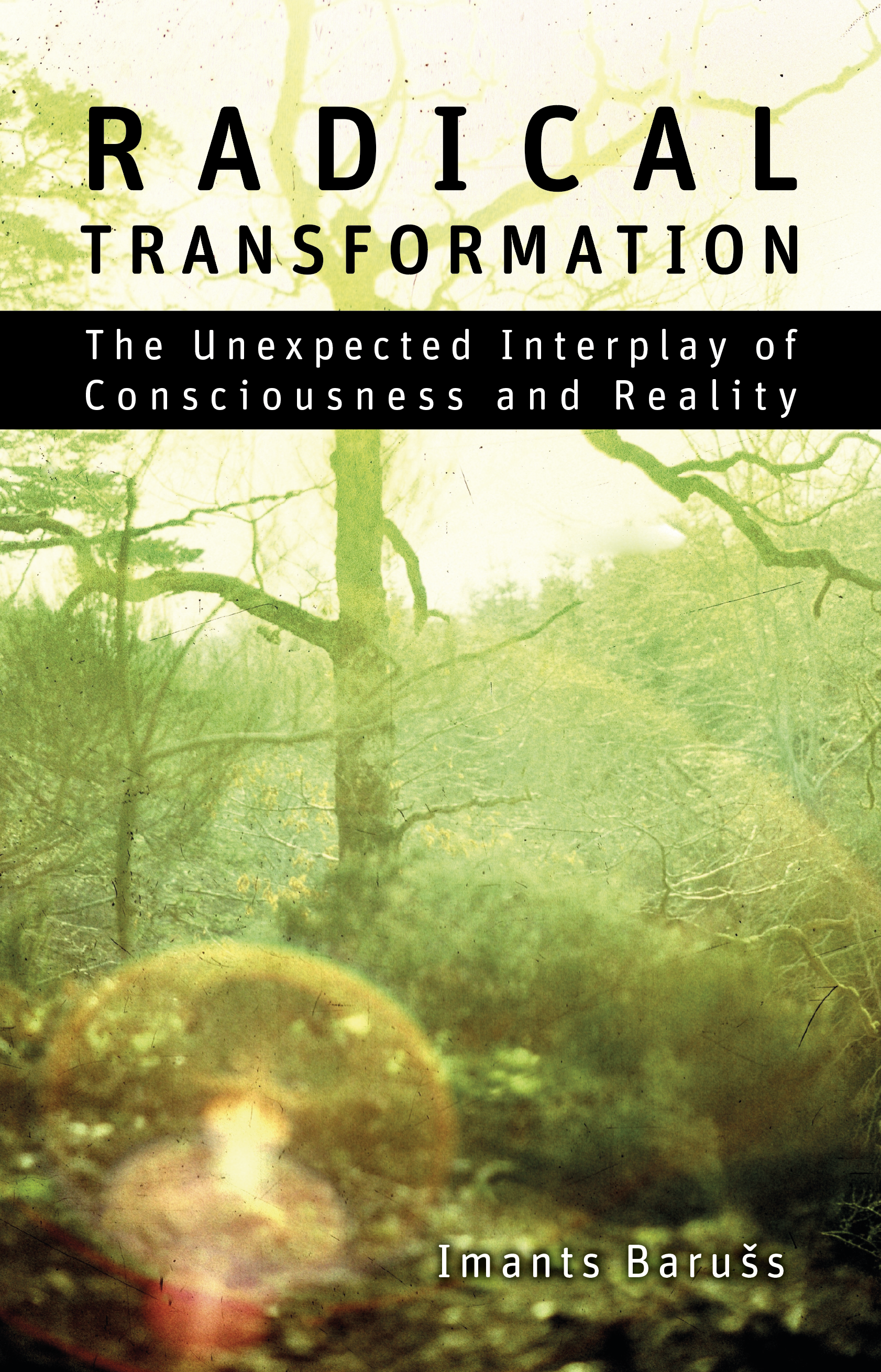 In
Radical Transformation, Imants Barušs leads the reader out of the
receding materialist paradigm into an emerging post-materialist landscape in
which new questions present themselves. If consciousness has nonlocal
properties, then how are boundaries between events established? If consciousness
directly modulates physical manifestation, then what is the scope of such
modulation? If consciousness continues after physical death, then how much
interference is there from non-physical entities? As we face the threat of
extinction on this planet, is there anything in recent consciousness research
that can help us? Are there effective means of self-transformation that can be
used to enter persistent transcendent states of consciousness that could resolve
existential and global crises? The author leads the reader through discussions
of meaning, radical transformation, and subtle activism, revealing the
unexpected interplay of consciousness and reality along the way.
In
Radical Transformation, Imants Barušs leads the reader out of the
receding materialist paradigm into an emerging post-materialist landscape in
which new questions present themselves. If consciousness has nonlocal
properties, then how are boundaries between events established? If consciousness
directly modulates physical manifestation, then what is the scope of such
modulation? If consciousness continues after physical death, then how much
interference is there from non-physical entities? As we face the threat of
extinction on this planet, is there anything in recent consciousness research
that can help us? Are there effective means of self-transformation that can be
used to enter persistent transcendent states of consciousness that could resolve
existential and global crises? The author leads the reader through discussions
of meaning, radical transformation, and subtle activism, revealing the
unexpected interplay of consciousness and reality along the way.
“This is the kind of creative and well-informed
thinking we need to move ahead toward a more comprehensive understanding of the
mind!” — Professor Charles Tart, author of
The End of Materialism.
“After reading
Radical Transformation
you will never think of human consciousness in the same way again. Imants Barušs
reveals reasons why consciousness cannot be produced by the brain, and why it is
much more glorious than we have taken it to be. This book is science at its
best: fearless, futuristic, and rock-solid.” — Larry Dossey, MD, author of
One Mind: How Our Individual Mind is Part of a
Greater Consciousness and Why it Matters.
“Radical
Transformation is a bold empirical study
arguing that the findings underpinning a new post-materialist understanding of
consciousness can help us address systemic global crises beyond the limitations
of our current self-understanding, patterns of thought and tendencies towards
procrastination.” — David Lorimer, Editor,
Paradigm Explorer.
". . . the entrenchment of materialistic physicalism in
the academic establishment, [creates] a formidable obstacle to any serious (even
scientific) discussion about mental, psychical or mystical phenomena. It is a
brave orthodox scientist who risks his tenure and the fury of his colleagues,
who sheds the biases of his profession and is willing to engage with the
investigation and theorising of truly profound anomalies. . . .
Barušs is such a hero -- an accredited academician who is striking at the very
roots of precisely how orthodox science should tackle provocative anomalies. . .
. Barušs's conclusion is that human consciousness itself is sleepwalking towards
planetary disaster if we can't learn to understand our own mind and how it
creates and uses a protean, non-local, multiphasic 'reality' - the eponymous
'radical transformation'. . . . This is definitely not hysterical waffle from a
crank . . . Here is a lucid, rational and surprisingly readable dissection of
precisely why today's materialistic science and medicine have failed us in
crucial areas. This deceptively modest book may be one of the most important
steps on the way to a better understanding of the many genuine mysteries of the
human mind. . . ." 5 stars --- Bob Rickard, Fortean Times, Volume 408,
p. 61.
The book can be obtained from the publisher
Imprint Academic or your favourite bookseller. Enjoy!
Alterations of Consciousness: An
Empirical Analysis for Social Scientists, Second Edition
American Psychological Association, 2020
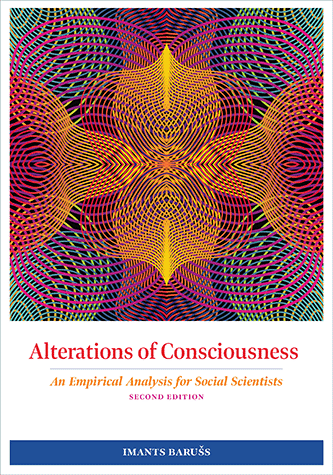 From
the back cover of the book:
From
the back cover of the book:
"Now in a second edition, this pathbreaking investigation into the nature of
cognitive reality explores various manifestations of consciousness, including
more familiar states such as sleeping and dreaming, as well as hypnosis, trance,
dissociation, and near-death experiences. Barušs brings to bear significant new
neuroscientific evidence supporting the occurrence of these phenomena and their
nature and purpose. Other major updates include the latest findings in sleep
research, therapeutic discoveries related to psychedelics, empirical research
into transcendent states, developments in the study of anomalous phenomena such
as purported alien abduction and UFOs, and a new conclusion discussing an
exosomatic theory of consciousness that can account for the findings in the
text. Students and other readers of this engaging text will sharpen their
critical thinking skills and gain an enriched understanding of consciousness,
reality, and the scientific endeavor."
Here are some blurbs:
"Okay, so this second edition is readable, rigorous, and brilliantly inclusive,
and yet it reads like a cross of William James's The Principles of
Psychology and his The Varieties of Religious Experience, updated
for the 21st century. Consciousness researchers and students will probably carry
it around with them, but it also feels like anyone can use Barušs's novel and
practical insights to gain an understanding of human experience that includes
phenomenology, cognitive science, and neuroscience as well as psychedelics,
UFOs, and gifts of imagination."
---Julia Mossbridge, PhD, Executive
Director, The Institute for Love and Time
"This book will without doubt be a major contribution to contemporary
consciousness research literature, both a gift and a resource to all interested
parties."
---Allan Combs, PhD, President Emeritus of The Society for Consciousness Studies
and recipient of their Lifetime Achievement Award; Professor of Transformative
Inquiry, California Institute of Integral Studies, San Francisco, CA
"Alterations of Consciousness fills in the large gap in our
understanding of reality, including an expansive theory of consciousness based
on evidence presented in the book. Barušs is uniquely qualified to write this
book due to his background in psychology, philosophy, and mathematics, as well
as personal experiences and experiments conducted with his students. The book is
very readable, with a logical flow that avoids jargon. It's guaranteed to
broaden your thinking, including thinking about yourself in a new way."
---Gayle Kimball. PhD, Author of 20 books, including the new trilogy The
Mysteries of Reality, The Mysteries of Knowledge Beyond the Senses, and
The Mysteries of Healing
"A marvelously readable, wide-ranging, and insightful book that makes the case
that we consider to be 'normal' consciousness is---to paraphrase William
James---just one out of a wide spectrum of different states. Altered states have
a massive amount to tell us about the nature of reality and the limitations of
our normal awareness, and this book guides us expertly through them.
---Steve Taylor, PhD, author of The Leap and Spiritual Science
"Barušs gracefully covers eight diverse topics of consciousness with a clear and
concise style that will appeal to beginners, yet the material is thoroughly
cited for the experts, to broaden their horizons as well."
---Paul Kalas, PhD, Adjunct Professor, University of California, Berkeley;
author of The Oneironauts: Using Dreams to Engineer Our Future
"Full disclosure ... I have been an admirer of the work of Imants Barušs for
many years now. The broad range of his interests runs contrary to the current
trend of simple specialization within narrowly defined fields. His forays into
complex questions (can you pick a more difficult problem to study than
consciousness?) produce a synthesis of ideas ranging from hard empirical data
to grand philosophical questions. After reading this, the world you thought you
knew will never seem quite the same again."
---William Bengston, PhD,
President, Society for Scientific Exploration
"Controversial, thought-provoking, and accessible, this new edition of
Alterations of Consciousness is one of the most intriguing books you will
read this year. It is a must-read for anyone interested in learning more about
the nature of reality and what lies on the fringe of human experience."
---Robert Horvath, BA (Psychology), King's University College at Western
University Canada, London, Ontario; MA (Philosophy), Katholieke Universiteit
Leuven, Belgium
The book can be obtained from the publisher
APA Books or your favourite bookstore.
Transcendent Mind: Rethinking the
Science of Consciousness
American Psychological Association, 2017
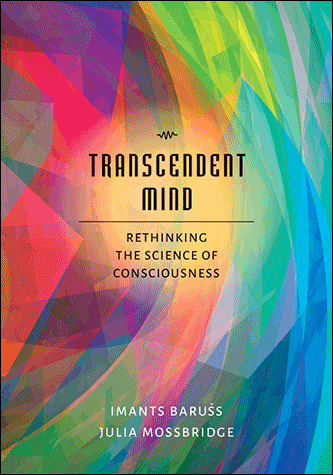 Julia
Mossbridge and I decided that it was time for a post-materialist book about the
nature of consciousness, so we wrote one. This is it! We like it a lot! The
following is the description of the book from the back cover, along with some
endorsements and reviews:
Julia
Mossbridge and I decided that it was time for a post-materialist book about the
nature of consciousness, so we wrote one. This is it! We like it a lot! The
following is the description of the book from the back cover, along with some
endorsements and reviews:
Where does consciousness come from? For most scientists and
laypeople, it is axiomatic that something in the substance of the brain —
neurons, synapses and gray matter in just the right combination — create
perception, self-awareness, and intentionality. Yet despite decades of
neurological research, that "something" — the mechanism by which this process is
said to occur — has remained frustratingly elusive. This is no accident, as the
authors of this book argue, given that the evidence increasingly points to a
startling fact: consciousness may not, in fact, reside in the brain at all.
In this wide-ranging and deeply scientific book, Imants Barušs and Julia
Mossbridge utilize findings from special relativity and quantum mechanics,
modern and ancient philosophers, and paranormal psychology to build a rigorous,
detailed investigation into the origins and nature of human consciousness.
Along the way, they examine the scientific literature on concepts including
mediumship, out-of-body and near-death experiences, telekinesis, "apparent"
versus "deep time," and mind-to-mind communication, and introduce eye-opening
ideas about our shared reality.
The result is a revelatory tour of the "post-materialist" world — and a
roadmap for consciousness research in the twenty-first century.
Transcendent Mind is a landmark text in the history of western
psychology. It is perhaps the first postmaterialist psychology textbook of the
21st century. It offers a rational analysis of theories of consciousness and a
rigorous discussion of essentially all the data collected in western science
that speak to the possibility of shared mind, and mind without brain. It is
data-driven yet open-minded and scholarly, yet accessible. It should be required
reading for a new generation of consciousness investigators.
—Leanna
J. Standish, PhD, ND, LAc, FABNO, Professor, School of Naturopathic Medicine,
Bastyr University, Kenmore, WA; and School of Public Health, School of Medicine,
University of Washington, Seattle
Few people on the planet can match Imants Barušs and Julia Mossbridge in
their familiarity with and understanding of the relevant research and in their
perspective to put that research into context. Transcendent Mind stands
out among other books on consciousness in its consideration of all the data both
for and against various interpretations, and in its rigorous scientific thinking
about mind–body interactions.
—Bruce Greyson, MD, Carlson Professor
Emeritus of Psychiatry and Neurobehavioral Sciences, University of Virginia
School of Medicine, Charlottesville
Here is a breath of clean fresh air for the serious explorer of
consciousness. I've waited my whole career for such a book, given to us now by
two of the foremost researchers in the field.
—Allan Leslie Combs,
PhD, Doshi Professor of Consciousness Studies and Director, Center for
Consciousness Studies, California Institute of Integral Studies, San Francisco;
President, The Society for Consciousness Studies; author of Consciousness
Explained Better: Towards an Integral Understanding of the Multifaceted Nature
of Consciousness
Should be compulsory reading for every student of parapsychology, the
paranormal, spirituality and life itself. The authors have done a magnificent
job translating scientific research to make a compelling case for consciousness
separate from the brain. They are both highly respected in their field and this
book is destined to become an important one for generations of students to come.
Shame about the price but for the amount of golden research collated and
articulated in there it is worth every penny. Simply brilliant.
—Book Lover, Amazon.com, September 6, 2016
I cannot rate this book highly enough! This is simply the most intelligent
consideration of this topic in print. The meticulous research, honesty even when
it is not in favor of the hypothesis, collection of data, and the absolutely
brilliant offering of multiple interpretations of data is unsurpassed.
—R. Pickering, Amazon.com, September 19, 2016
Once upon a time, not so long ago, there was a kingdom called
Science whose citizens were guided by a uniform belief — that their
consciousness is produced by the chemistry, physiology, and anatomy
of the physical brain. Forfeited in this belief was the capacity for
free will, as well as any higher meaning and purpose to existence.
The possibility that consciousness might survive the physical death
of the brain and body was considered heretical and blasphemous.
Enormous pressure was exerted on the guardians of science to conform
to the concept of materialism undergirding this precious belief
system. In support of these beliefs, the centurions of science
marshaled enormous bodies of data that, they were convinced,
confirmed their views. They were so emphatic in their position that
data to the contrary were largely dismissed as irrelevant, and those
who dared to challenge the materialistic perspective were often
denigrated as traitors to the scientific tradition. But just when
the materialistic perspective was considered beyond reproach and
safe from significant challenge, there came this shocking
announcement from two prominent consciousness researchers: “We are
in the midst of a sea change. Receding from view is materialism,
whereby physical phenomena are assumed to be primary and
consciousness is regarded as secondary. Approaching our sights is a
complete reversal of perspective. According to this alternative
view, consciousness is primary and the physical is secondary. In
other words, materialism is receding and giving way to ideas about
reality in which consciousness plays a key role.” This is the
opening salvo of Transcendent Mind: Rethinking the Science of
Consciousness (page 3).
I have introduced my comments about
Transcendent Mind as a kind of fairy tale, a product of the
imagination, because that is how this book may be regarded by those
who have not followed the revelations of consciousness research for
the past few decades. Across this period, a formidable body of data
has accumulated that the materialistic credo is not merely off base
in a few minor details, but is fundamentally flawed beyond repair.
The trend toward this view is “quietly occurring within a swiftly
evolving and increasingly postmaterialist paradigm,” the authors
contend. The explanation of how this “sea change” has come about is
the theme of Transcendent Mind.
In their challenge to
materialism, authors Barušs and Mossbridge contend that “the deep
structures underlying our waking consciousness are fundamentally
spatially and temporally nonlocal in nature (page 81).” The
implications for our understanding of our own minds, and the
practical ways in which we lead our lives, are enormous.
The
authors explore empirical data, too long ignored, indicating that
“consciousness is capable of existing in an extended or transcendent
state in which it is not completely bound to the brain (page 171).”
This data supports the concept of “shared mind,” minds linked across
space and time to form a collective, unitary human consciousness.
This view of nonlocal, shared, transcendent mind is supported by
abundant empirical evidence, as the authors show, such as near-death
experiences, telepathy, clairvoyance, and precognition. These
phenomena might be predicted from an “unconstrained mind that is
directly connected to other minds, probably outside the usual
confines of space and apparent time (page 177).”
Do not suppose
that the idea that consciousness is fundamental and irreducible to
anything more basic is some hare-brained notion conjured in the
fever dreams of wayward new agers, as is often charged. In fact,
consciousness as fundamental has an impressive pedigree. It has been
endorsed by some of the greatest figures of twentieth-century
science such as Max Planck, the founder of quantum physics: “I
regard consciousness as fundamental. I regard matter as derivative
from consciousness. We cannot get behind consciousness. Everything
that we talk about, everything that we regard as existing,
postulates consciousness.” Erwin Schrödinger, the Nobel
Prize-winning physicist, agreed: “Although I think that life may be
the result of an accident, I do not think that of consciousness.
Consciousness cannot be accounted for in physical terms. For
consciousness is absolutely fundamental. It cannot be accounted for
in terms of anything else.” As to the contention of Barušs and
Mossbridge of shared, unitary minds, we find Schrödinger in
agreement: “The overall number of minds is just one…. In truth there
is only one mind.” And as the eminent physicist David Bohm observed,
“Deep down the consciousness of mankind is one. This is a virtual
certainty … and if we don’t see this it’s because we are blinding
ourselves to it.” (Citations for these quotations are available in
my book One Mind, mentioned below.)
If you are not intrigued by
the evidence in Transcendent Mind, well, bear in mind the adage,
“There is a principle which is a bar against all information, which
is proof against all arguments and which cannot fail to keep a man
in everlasting ignorance — that principle is contempt prior to
investigation.” But if you are among those who are hesitant to
adopt materialism as part of your personal credo, this erudite,
reader-friendly book will perhaps fill in some of the blanks on your
map of reality. You may discover not only empirical evidence for
transcendent, shared mind, but for a transcendent reality as well.
—Larry Dossey, MD, Author: One Mind: How Our Individual Mind Is
Part of a Greater Consciousness and Why It Matters, Amazon.com,
September 23, 2016
I highly recommend this book.
—Susan
Gordon, "Transcending Mind in Time," PsycCRITIQUES, January
2, 2017, Vol. 62, No. 1, Article 9
Transcendent mind
es una obra excepcional en el catálogo de la American Psychological
Association, la principal asociación que nuclea a los psicólogos
americanos, escrita por dos psicólogos, Imants Barušs y Julia
Mossbridge, quienes plantean un desafiante para la actual corriente
psicológica: "El retroceso del materialismo, por el cual se supone
que los fenómenos físicos son primarios y la conciencia es algo más
secundario" -sostienen. Pero esta obra representa una subversión
total a esta perspectiva. Según su posición, "la conciencia es
primaria y la física secundaria." En otras palabras, el materialismo
está retrocediendo y dando paso a ideas sobre la realidad en las que
la conciencia juega un rol clave. El propósito de este libro es
explorar lo que hace la conciencia cuando no asumimos
automáticamente que ésta debe surgir de las operaciones de la
materia. Baruss y Mossbridge examinan las investigaciones de los
aspectos anómalos de la conciencia -como las experiencias cercanas a
la muerte, las interacciones con seres desencarnados y la influencia
mental directa sobre procesos físicos y examinan la naturaleza de la
conciencia y su relación con los fenómenos físicos.
—Jorge
Villanueva, Instituto de Psicología Paranormal E-BOLETÍN PSI.
Vol.12, No.1, Enero 2017
In the times in which we live, every
aspect of our lives as members of our civil society and as
individuals is touched, colored, and largely controlled by the
foundational world view held by the major scientific,
academic,corporate, and political entities. And while this
arrangement is normal enough, if the foundational world view is
inadequate or flawed, everything that follows will have and perhaps
magnify those inadequacies and flaws. This has been the case for a
few centuries ever since science began to view the world through the
lens of lifeless atoms. Reducing matter, even complex human beings
into nothing more than "complex collections of molecules" makes it
OK to depersonalize people, treat animals as industrial inputs, and
treat our environmental resources as ours to exploit. The fly in
this ointment is the chance that this world view is flawed; that
consciousness is a fundamental force of existence; that we are all
connected; that in the web of life everything affects everything
else. For there to be a change from the prevailing world view, the
change will have to come from the community of science, as that is
where the foundation lays. And for that change to start, there has
to be a set of first principles set down, there has to be and
agreement on the definition of words and terms, and there has to be
sufficient research all ready done, even if not widely recognized,
that both refutes the current world view and lays a more or less
clear path towards an imagined future, better world view. This is
precisely what this book achieves. It is a foundational text in the
path to this new world view. I cannot recommend it highly enough.
—Dr David Shuch, Amazon.com, February 9, 2017
"[This] book is an invaluable addition to the literature arguing that
consciousness (however defined) plays a key role, and perhaps an essential role,
in the construction of reality (however defined). It is radical, even at times
outrageous, but it makes its case elegantly and (for many readers) persuasively."
—Stanley Krippner, Journal of Scientific Exploration,
31(1), pp. 94–97.
"I strongly recommend it to anyone involved with science or deeply interested in
the nature of mind."—Charles Tart, May 4, 2017 blog on
http://blog.paradigm-sys.com/.
"According to journalistic protocol, reviewers are expected to
include some criticism to demonstrate their critical distancing and
objectivity, since no book is perfect. I’ll break tradition, because
my objections are trivial when compared to this book’s overall
contribution. This is simply a flatout courageous, evidence-based,
tightly reasoned document that no doubt will infuriate many paid-up
materialists who read it—but that is one of the best compliments
that a book of this genre could receive."—Larry Dossey, Journal of Scientific Exploration,
31(1), pp. 98–110.
"Possibly one of the most important books I've read in several years - truly groundbreaking.
I can't recommend it highly enough. Absolutely superb production and design as well."—Lorin
Cutts, Amazon.com, June 13, 2017
"Excellent research in
parapsychology is done year in and year out, yet is almost never
published in mainstream scientific journals. This excellent book
takes apart the often flippant criticisms against such research and
exposes the fact that rigorous studies are all to often dismissed,
simply because the subject matter is rejected out of hand. Perhaps
this book represents a break in the dam of mainstream bias, having
been published by the American Psychological Association Press. I
hope so. Serious consideration of the emerging paradigm shift in the
science of consciousness and the mind is long overdue." — Steve
Blumberg, Amazon.com, October 19, 2018
"This amazing book goes on my
'special shelf' of key works which, if they were to be truly
embraced and lived by modern scientists (and in fact everyone),
they would catapult us out of our currently-unacknowledged dark
age of scientific materialism. We stand on the brink of a new
era of scientific understanding of ourselves, the place of our
consciousness in the universe and our responsibility to step
into maturity, if only we would let go of old dogmas and
re-integrate our inner wisdom into daily awareness.
“Transcendent Mind” is a gentle yet powerful impetus to do so.
Every point is discussed with the clarity of detachment and
openness, enabling the reader to settle in and ponder the
observations and ideas on many levels. It is refreshing to read
a book which is free of the arrogance, dismissiveness, judgment
and vigorously defended belief that characterize so much
scientific thinking and writing today. Imants Baruss and Julia
Mossbridge invite us to bring out the inner scientist in us all,
restoring true observation to the important position in which it
belongs. Not least, the book is very readable, sensible, flowing
and accessible. A non-expert reader could enjoy it and get the
gist, as with a good story, without being lost in technical
detail. Yet its scientific clout is there, for anyone who reads
it honestly and pays attention to the scope being offered.
Definitely recommended." — D. Trussell, Amazon.com, December 16,
2019
Transcendent Mind
can be purchased from the publisher
APA Books, from
Amazon.com, from
Amazon.ca, or from your favourite bookseller. Enjoy reading
it!
The Impossible Happens: A Scientist's
Personal Discovery of the Extraordinary Nature of Reality
Iff Books, 2013
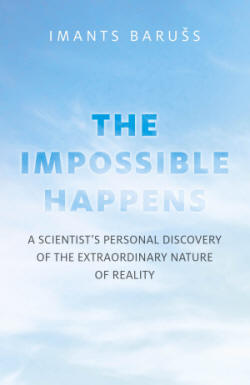
I wrote this book because I have
found that my students can often relate to personal experiences better than they
can relate to scientific studies. In this case, these are some of the personal
experiences that I have had that, along with empirical evidence from scientific
studies, have led me away from materialism toward a transcendent view of
reality. In particular, I describe the sequence of dreams that I had over the
course of several decades that led me to realize that some of my dreams
anticipate future events. In addition, I talk about some of my efforts at
distance healing and my experiences with a medium who regularly produces correct
information that was not acquired through ordinary means. It is my hope that my
experiences can provide an inspiration for others to explore these phenomena for
themselves.
Gary Schwartz kindly wrote the
following blurb for the book: "Sometimes the most convincing and meaningful data
come not from the university laboratory but from the laboratory of personal
life. Dr. Imants Baruss practices the integration of academic and self-science
in an inspiring and compelling manner. This book stunningly illustrates how the
trained scientific mind can help reveal the seemingly impossible in everyday
life." - Gary E. Schwartz, PhD, Professor of Psychology and Medicine at the
University of Arizona, author of THE AFTERLIFE EXPERIMENTS and THE SACRED
PROMISE.
And here's a review: "Imants
Baruss is not claiming that the logically impossible happens. He doesn't claim
to have found a round square, for example, or a colorless blue disk. But he does
claim to have experienced some things that seem to be physically impossible —
things such as dreaming of a future event before it happens, healing someone at
a distance through mental imagery, curing a lesion on his own liver by analyzing
his dreams, and communicating with dead people. It is perfectly reasonable to be
skeptical about such claims. What is so effective about the approach Imants
takes in this book is that he shows that it is also perfectly reasonable to be
open-minded about these claims, for he describes his experiences and explains
his thinking about them in a way that is consistent with the basic principle of
empiricism: try it and see for yourself. ~ Jack Call, PhD, Professor of
Philosophy, Citrus College, author of God is a Symbol of Something True
Here's an unsolicited e-mail that
I received on January 10, 2014: "> ......just finished reading it. I wailed
through it. It was surprising to me that I would peel through a book that fast.
I could not put it down. What a journey! Thank you for choosing the courage to
be vulnerable and exposing an experience that is difficult to prove
scientifically as a scientist. An experiential component combined with
discernment is worth a scientific investigation and measure. Human beings
experience more than our brain can define. It was like reading a science project
combined with the authors personal experience at the same time. I struggle not
to write my own opinions, but I discern that through physical and
psycho/spiritual experiences one discovers we are not just cognitive beings.
Empirical evidence need not be proven within these experiences but rather living
through the heart is evidence enough and ultimately heals us from within and
without. In witnessing that, perhaps there is nothing to prove. Or is there?"
--- Monica Antonowitsch
Copies of The Impossible
Happens can be obtained from the publisher,
John Hunt Publishing, or the usual booksellers. The book is also available
on about 17 different e-book platforms, including iTunes.
Science as a Spiritual Practice
Imprint Academic, 2007
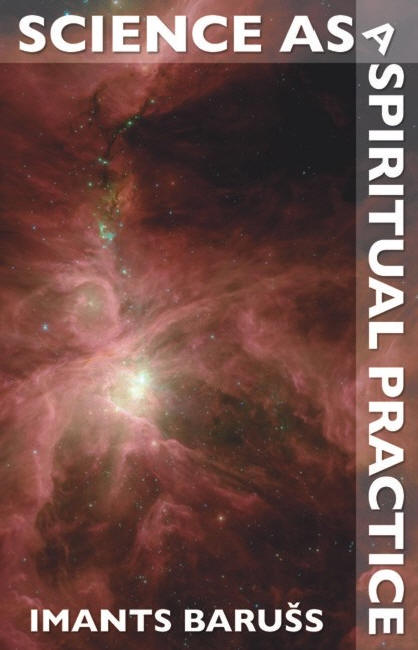
Science as a Spiritual Practice is in three parts. In the first part I
argue that there are problems with materialism and that self-transformation
could lead individual scientists to more comprehensive ways of understanding
reality. In the second part I take on the contentious notion of inner knowledge
and show how access to inner knowledge could be possible in some altered states
of consciousness. The third part is an analysis of the philosophy of Franklin
Wolff, who claimed that the transcendent states of consciousness which occurred
for him resulted from his mathematical approach to spirituality. The following
are the jacket blurbs:
"Science as a Spiritual Practice is a remarkable achievement, of which
many of the patriarchs of science, such as Bacon and Newton, would likely
approve. They would probably marvel at the banishment of spirituality from
science that has occurred in the modern era, and the irrational tenacity with
which it remains tabooed. Baruss's courageous, insightful book redresses this
development. His perspective makes science more scientific, not less." -- Larry Dossey, MD, author Space, Time & Medicine and
The Extraordinary Healing Power of Ordinary Things
"Science is now recognizing spiritual change and higher transcendent
conscious states. This book is at the cutting edge of neuroscience and spiritual
practice. It is essential reading for any scientist seeking consciousness
development." -- Peter Fenwick, MD, President of the Scientific and Medical
Network
I also received the
following endorsement:
"Science as spiritual
practice is a highly thought provoking book and is a must read for any
open-minded scientist who is interested in the nature of reality." -- Amit
Goswami, Professor Emeritus of Physics, University of Oregon, and author of
The Self-Aware Universe and other books
And from the
reviews:
"The author is
a true scientist, and one of the delights of this book is the way in which his
scientific curiosity keeps bubbling out to descriptions of surveys carried out
under his supervision to investigate aspects of deeper experience . . ." -- Chris
Clarke, networkreview, Summer 2007, pp. 47-48
"There is a
mature outlook to the book, an awareness that spirituality can make your life
more difficult . . . . There is no programme here, mind, but nor does the book
consist of just discussion and chatter. . . . Overall, Science as a Spiritual
Practice presents a thought-provoking discussion of the possible rewards and
costs of a particular kind of spiritual journey. If you're at an existential
crossroads, whatever they look like when they're at home, it could well be a
catalyst for change." -- Paul Kane, 2009, The Compulsive Reader
Science as a Spiritual Practice
can be obtained from the publisher,
Imprint Academic, or
Amazon.
Alterations of Consciousness: An Empirical Analysis for Social Scientists
American Psychological Association, 2003
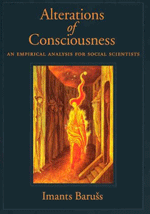 This book is an overview of alterations of consciousness such as daydreaming,
sleep, dreaming, hypnosis, and psychedelics. I have included some
less-traditional alterations such as sensory restriction, trance, transcendence, and near-death experiences. But also some truly controversial ones such as
possession, alien-abduction experiences, and past-life experiences. Throughout, I have tried to give an even-handed presentation of the subject matter.
While the book is primarily an academic book that I wrote for use as a textbook in my general level altered states of consciousness course, it would also
be of interest to scientists looking for an overview of altered states of consciousness, and general readers with an interest in consciousness. I tried, as much
as possible, to write the book in an engaging style. From the reviews:
This book is an overview of alterations of consciousness such as daydreaming,
sleep, dreaming, hypnosis, and psychedelics. I have included some
less-traditional alterations such as sensory restriction, trance, transcendence, and near-death experiences. But also some truly controversial ones such as
possession, alien-abduction experiences, and past-life experiences. Throughout, I have tried to give an even-handed presentation of the subject matter.
While the book is primarily an academic book that I wrote for use as a textbook in my general level altered states of consciousness course, it would also
be of interest to scientists looking for an overview of altered states of consciousness, and general readers with an interest in consciousness. I tried, as much
as possible, to write the book in an engaging style. From the reviews:
"[Barušs] describes and critiques the various scientific approaches, all with a combination of brisk research summaries, a narrative sense of how one
question leads to another and an engaging, almost conversational style. . . . Though billed as 'An Empirical Analysis for Social Scientists,' this volume
should prove useful to anyone seriously interested in research on these subjects and on the questions left for future research." -- William Kowinski, San Francisco Chronicle
"Alterations of Consciousness is the product of Baruss' keen insights, his focus
on the ideas behind research, the many theoretical connections that he
successfully makes, and his multifaceted approach to the subject matter. The
book is quite interesting and engaging. It can intrigue readers who are looking
for an introduction to the topic of consciousness, and still challenge those who
have enough background knowledge to disagree or concur with some of Baruss'
claims. This is a book that puts readers on a pedestal, gives them the tools to
understand a complex subject, and then dares them to think deeply about it. At
the end, readers may not always agree with Baruss' view of things, but they will
undoubtedly savor the realization that they have learned a great deal about
consciousness by reading this book." -- Maura Pilotti, Metapsychology
This book has been taken out of print, although the Kindle version is still
available for sale:
https://www.amazon.com/Alterations-Consciousness-Empirical-Analysis-Scientists-ebook/dp/B003Q6CX1O/ref=mt_kindle?_encoding=UTF8&me=.
However, I recommend the second edition which goes on sale July 28, 2020 and can
be seen above.
Authentic Knowing: The Convergence of Science and Spiritual Aspiration
Purdue University Press, 1996
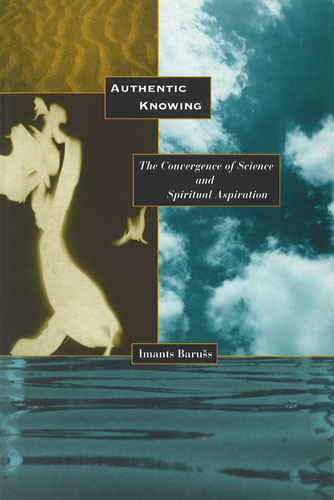 What I tried to do in this book was to show how science and spiritual aspiration converge on fundamental questions about the nature of
consciousness and
reality when authentically pursued. The book includes chapters about authenticity (what it means to be true to oneself), science (what happens when
science encounters the sublime), transcendence (the promise of enlightenment), theory (a theosophical model of reality), and self-transformation
(adventures and misadventures of a spiritual aspirant). From the reviews:
What I tried to do in this book was to show how science and spiritual aspiration converge on fundamental questions about the nature of
consciousness and
reality when authentically pursued. The book includes chapters about authenticity (what it means to be true to oneself), science (what happens when
science encounters the sublime), transcendence (the promise of enlightenment), theory (a theosophical model of reality), and self-transformation
(adventures and misadventures of a spiritual aspirant). From the reviews:
"All in all, the book provides enjoyable, enlightening, and thought provoking reading. . . . Throughout, the author proves to be a worthy and mature guide
for a journey that contemplates both the spoken and the unspoken, the seen and the unseen, and keeps its sojourners within light's bounds." -- Thomas W. Draper, Journal of Consciousness Studies
For more information or to purchase a copy, see the publisher's web page:
PUP.
The Personal Nature of Notions of Consciousness
A Theoretical and Empirical Examination of the Role of the Personal in the Understanding of Consciousness
University Press of America, 1990
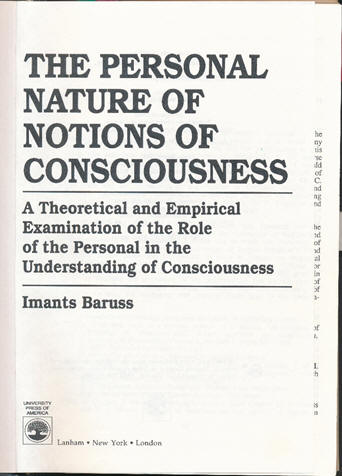
This book is my doctoral dissertation in which my supervisor Robert Moore and I tried to circumscribe the state of scientific knowledge concerning consciousness in the mid-1980s and to better understand the disparity of notions of consciousness of the scientists and academics studying it. What we
found, both through theoretical and empirical investigation, was that there is a material-transcendent dimension concerning beliefs about consciousness and reality that underlies the Western intellectual tradition, which, in particular, colours the manner in which research about consciousness is conducted.
From the reviews:
"[This book makes] a valuable first contribution to the important project of empirically establishing a typology of views of
consciousness." -- Roger Walsh, Journal of Transpersonal Psychology
For more information or to purchase a copy, see the publisher's web page:
UPA.

 What
happens when we die? Death is clearly an altered state of consciousness. But is
it merely oblivion, as materialists believe, or does consciousness continue in
some form? And, if so, what are its properties? In this book, the author
investigates the scientific data for answering these questions in chapters about
after-death communication, mediumship, instrumental transcommunication,
near-death experiences, past-life experiences, and other anomalous phenomena
associated with death. This discussion will broaden the reader’s perspective and
fill an educational need for researchers, teachers, and practitioners of this
understudied subject matter.
What
happens when we die? Death is clearly an altered state of consciousness. But is
it merely oblivion, as materialists believe, or does consciousness continue in
some form? And, if so, what are its properties? In this book, the author
investigates the scientific data for answering these questions in chapters about
after-death communication, mediumship, instrumental transcommunication,
near-death experiences, past-life experiences, and other anomalous phenomena
associated with death. This discussion will broaden the reader’s perspective and
fill an educational need for researchers, teachers, and practitioners of this
understudied subject matter.
 From
the back cover of the book:
From
the back cover of the book:


 This book is an overview of alterations of consciousness such as daydreaming,
sleep, dreaming, hypnosis, and psychedelics. I have included some
less-traditional alterations such as sensory restriction, trance, transcendence, and near-death experiences. But also some truly controversial ones such as
possession, alien-abduction experiences, and past-life experiences. Throughout, I have tried to give an even-handed presentation of the subject matter.
While the book is primarily an academic book that I wrote for use as a textbook in my general level altered states of consciousness course, it would also
be of interest to scientists looking for an overview of altered states of consciousness, and general readers with an interest in consciousness. I tried, as much
as possible, to write the book in an engaging style. From the reviews:
This book is an overview of alterations of consciousness such as daydreaming,
sleep, dreaming, hypnosis, and psychedelics. I have included some
less-traditional alterations such as sensory restriction, trance, transcendence, and near-death experiences. But also some truly controversial ones such as
possession, alien-abduction experiences, and past-life experiences. Throughout, I have tried to give an even-handed presentation of the subject matter.
While the book is primarily an academic book that I wrote for use as a textbook in my general level altered states of consciousness course, it would also
be of interest to scientists looking for an overview of altered states of consciousness, and general readers with an interest in consciousness. I tried, as much
as possible, to write the book in an engaging style. From the reviews: What I tried to do in this book was to show how science and spiritual aspiration converge on fundamental questions about the nature of
consciousness and
reality when authentically pursued. The book includes chapters about authenticity (what it means to be true to oneself), science (what happens when
science encounters the sublime), transcendence (the promise of enlightenment), theory (a theosophical model of reality), and self-transformation
(adventures and misadventures of a spiritual aspirant). From the reviews:
What I tried to do in this book was to show how science and spiritual aspiration converge on fundamental questions about the nature of
consciousness and
reality when authentically pursued. The book includes chapters about authenticity (what it means to be true to oneself), science (what happens when
science encounters the sublime), transcendence (the promise of enlightenment), theory (a theosophical model of reality), and self-transformation
(adventures and misadventures of a spiritual aspirant). From the reviews: